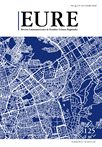Acciones colectivas territoriales en Chile, 2011-2013: de lo ambiental-reivindicativo al autonomismo regionalista
DOI:
https://doi.org/10.4067/S0250-71612016000100010Palabras clave:
conflicto social, desigualdades regionales, descentralizaciónResumen
Desde el año 2011 ha aumentado en Chile la conflictividad social, evidenciándose en un incremento de las acciones colectivas, donde las problemáticas regionales y locales han tenido mayor presencia en la vida política y en los medios. Sin embargo, si bien las ciencias sociales nacionales han dado cuenta del aumento de la conflictividad y constatado un nuevo ciclo de relaciones Estado-sociedad, existen escasas investigaciones sobre las particularidades de cada uno de los hechos que dan cuenta de tal transformación. El siguiente artículo busca avanzar en esa línea, caracterizando las principales acciones colectivas regionales desarrolladas desde 2011. La hipótesis de trabajo que lo sustenta es que, al interior de un marco nacional de conflictos sociales regionales, cohabitan distintos fenómenos que no necesariamente apuntan a la trasformación social ni al establecimiento de un nuevo ciclo de relaciones Estado-sociedad; y que, pese a ello, se aprecia una politización de los movimientos territoriales en un proceso que va desde una demanda plural hacia un metarrelato anticentralista y en favor de una transformación que lleve a una mayor autonomía política y financiera de las regiones.Descargas
Publicado
Cómo citar
Número
Sección
Licencia
Derechos de autor 2015 Revista EURE - Revista de Estudios Urbano Regionales

Esta obra está bajo una licencia internacional Creative Commons Atribución 4.0.
Al momento de aceptar la publicación de sus artículos, los autores deberán formalizar la cesión de derechos de autor a EURE, según las condiciones establecidas por la Revista.
Ésta establece que el autor autoriza a EURE de manera gratuita, exclusiva e ilimitada a reproducir, editar, publicar, distribuir, publicitar, comercializar y traducir el artículo, a cualquier soporte conocido o por conocer y desarrollar.
Del mismo modo, los autores aseguran que el artículo propuesto es original, no publicado y no propuesto para tal fin a otro medio de difusión.


